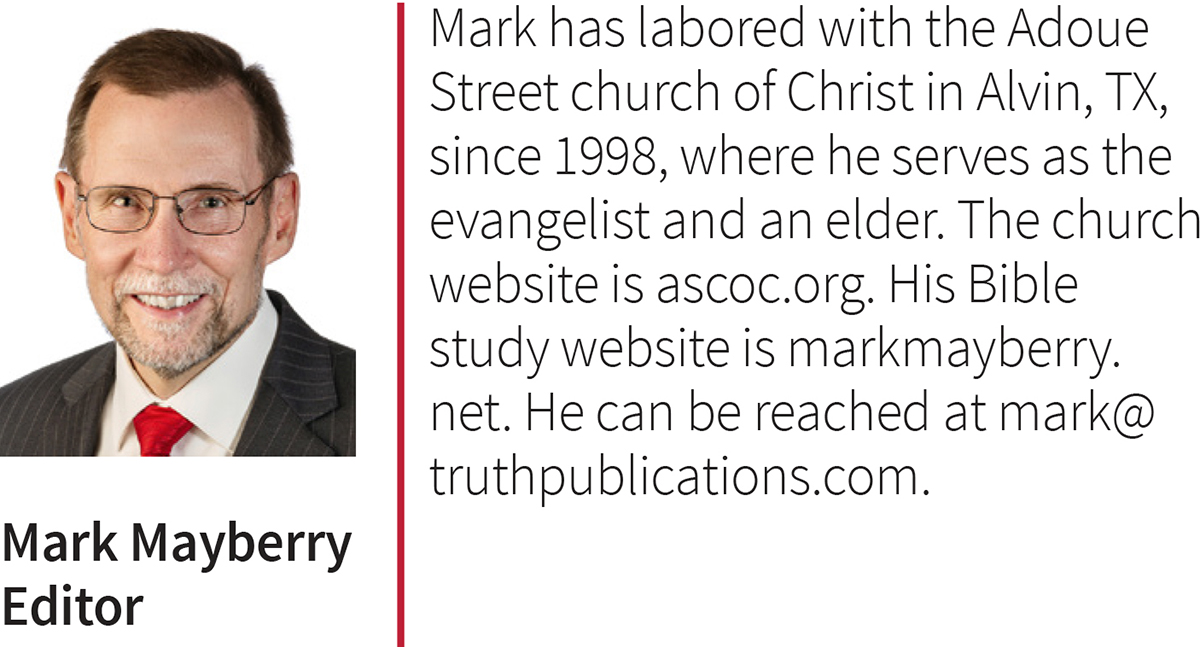by Mark Mayberry
Synopsis: From time to time, we provide brethren with the opportunity of addressing significant issues from different perspectives. Accordingly, we include these two articles relating to the observance of the Lord’s supper.
During this COVID crisis, faithful disciples have endeavored to fulfill their duty to worship the God of heaven, respect the decrees of men, and help maintain their brethren’s physical and spiritual well-being. Churches across the country have dealt with this crisis in various ways. Brethren have practiced social distancing. Instead of everyone assembling in the auditorium, some have opened up classrooms so that members may keep a safe distance from one another, connecting these rooms with the auditorium via audio/video feeds. Congregations have assembled in the parking lot and worshiped from their vehicles listening to a broadcasted audio feed while they conducted worship services from inside the auditorium. Others have adopted similar arrangements using Skype or Zoom Video Conferencing. During the height of the COVID crisis, the Alvin saints assembled in the parking lot and were seated so as to maintain proper distancing between respective families. We also have held classes via Zoom or by prerecorded video presentations of the Bible class lessons.
While I understand (and share) the frustrations that many feel from this prolonged crisis, here in Alvin, we have sought to comply with the demands of duly constituted civil authorities. We have encouraged folks who are sick or may have been exposed to the virus to exercise due caution and not assemble with the saints until it is safe to do so.
Looking at our brotherhood and seeing the conflict and strife that has arisen in some congregations, it is my fervent prayer that brethren will continue to manifest patience with one another during these challenging times. Please respect the decisions made by local elders as they prayerfully and persistently attempt to balance the physical and spiritual concerns of the flock entrusted to their charge.
In this article, let us focus on the impact that the COVID crisis has had upon the observance of the Lord’s supper. In the November 2020 issue of Truth Magazine, I presented the biblical teaching on the origin of this observance, the significance of the emblems, and a consideration of the day, frequency, and purpose of the observance. In obedience to Christ’s command, faithful brethren observe the Lord’s supper, partaking of the unleavened bread and the fruit of the vine on the first day of each week. Those who partake worthily look back to Jesus’s death on the cross, forward to the Lord’s triumphant return, inward in self-examination, and outward in proclaiming His death to the world.
This memorial feast, which commemorates the sacrifice of Jesus Christ on the cross, is an act of communion, i.e., sharing fellowship in a common union. The Greek word koinōnia is translated as “contribution,” “fellowship,” “participation,” or “sharing” in the NASB. It signifies shared association and joint participation in various activities or endeavors. It refers to “(1) close association involving mutual interests and sharing, association, communion, fellowship, close relationship (hence a favorite expression for the marital relationship as the most intimate between human beings); (2) attitude of good will that manifests an interest in a close relationship, generosity, fellow-feeling, altruism; (3) abstract for concrete, sign of fellowship, proof of brotherly unity, even gift, contribution; (4) participation, sharing in something” (BDAG, 552-554).
How is the Lord’s supper an act of shared fellowship? First, those who partake in this memorial feast share fellowship with the Lord Jesus Christ (Matt. 26:29; Luke 22:18). Second, those who assemble on the first day of the week partake of the Lord’s supper in the local assembly (Acts 2:42; 20:7). Third, those who participate share fellowship with the worldwide brotherhood of believers, who also observe this memorial feast on the Lord’s day. Writing to the Corinthian disciples from Ephesus, Paul said, “Is not the cup of blessing which we bless a sharing (koinōnia) in the blood of Christ? Is not the bread which we break a sharing (koinōnia) in the body of Christ? Since there is one bread, we who are many are one body; for we all partake of the one bread” (1 Cor. 10:16-17). Although Achaia and the Province of Asia were on different continents, brethren in both locations shared in this memorial feast.
Individual Christians are to remember and reflect in observing the Lord’s supper (1 Cor. 11:27-28); yet, the observance also involves collective action (Acts 2:42, 46-47; 20:7). In 1 Corinthians 11, when Paul rebuked their corruption of the Lord’s supper, he repeatedly used the phrase, “you come together” (vv. 17, 18, 33, 34).
In 1 Corinthians 10:14-22, Paul warns his readers against becoming involved in idolatrous practices. Eating meat in an idol’s temple unites the eater with error and false religion. By participating in pagan festivals, these “broad-minded” disciples expanded their circle of fellowship to include demons while simultaneously constricting it to exclude God. In contrast, through the observance of the Lord’s supper, believers unite with Christ and share in the blessings that His sacrifice affords. They share this experience with other believers, in both a local and universal sense.
The Bible refers to three distinct dispensations, i.e., time-periods. (1) During the Patriarchal age, God communicated directly with the heads of households; (2) During the Mosaic epoch, God ruled over the nation of Israel, which was subject to the Law; (3) During the Christian era, God’s people are collectively identified as the church/kingdom and are subject to the gospel. Looking back and considering how God was honored in the past can communicate valuable lessons for the present.
Before the Law of Moses was given at Mt. Sinai, God dealt with the patriarchs (i.e., the heads of households). We read of individuals building altars and offering sacrifice in different locations and circumstances: Cain and Abel, Enosh, Noah, Abraham, Abraham’s chief servant, Isaac, and Jacob.
After the Law was given at Mt. Sinai, the nation of Israel worshiped in the place of God’s choosing. During the wilderness wanderings, God led Israel by the pillar of fire/cloud--when it moved, they moved; where it remained, they encamped (Exod. 13:21-22; Neh. 9:12). After entering the promised land, Israel was commanded to worship in the place and manner that God specified. Instead of adopting the pagan practice of worshiping a pantheon of idols on high mountains, and on the hills, and under every green tree, they worshiped the One True God. Instead of following the norm of “every man doing whatever is right in his own eyes,” they carefully followed God’s commandments. Instead of worshiping “in every cultic place you see,” they worshiped in the place of His choosing (Deut. 12:1-14).
The communal aspect of Old Testament worship is repeatedly emphasized: The Passover lamb/goat was taken from the flock and kept in isolation until the 14th day of the first month, “then the whole assembly of the congregation of Israel is to kill it at twilight” (Exod. 12:6). Solomon dedicated the newly constructed temple in Jerusalem in the presence of all the assembly of Israel (2 Chron. 6:12-17, ff.). When Hezekiah restored temple worship after years of neglect, the whole assembly worshiped God according to the Law and under the leadership of the Levites (2 Chron. 29:28-30). The power of congregational/collective praise is continually affirmed in the Psalms (cf. 22:22 [see also Heb. 2:10-13]; 89:5; 107:31-32; 111:1; 149:1).
Similar emphasis on congregational assembly and worship exists in the New Testament (Acts 2:32, 42; 15:30; 20:7; Heb. 2:12; etc.). Note Paul’s repeated references to Aquila and Prisca, and “the church that is in their house” (Rom. 16:3-5; 1 Cor. 16:19), Nympha, and “the church that is in her house” (Col. 4:15), and Philemon, Apphia, and Archippus, and “the church in your house” (Phile. 2).
Both Old Testament Israel and New Testament Christians worshiped in the assembly/congregation. What is a congregation? Nelson’s New Illustrated Bible Dictionary says a congregation is “a gathering or assembly of persons for worship and religious instruction; a religious community, such as the people of Israel or the Christian church.” Originally, the Greek words ekklēsia and sunagōgē were synonymous, but they took on “separate and specialized meanings as the rift between the Christian church (ekklēsia) and the Jewish synagogue (sunagōgē) became more antagonistic” (s.v. “Congregation”).
Why did God emphasize congregational worship over individualized worship? Why did the Lord issue a prohibition against worshiping on every high hill and under every green tree? Such was the common practice of pagans. Isolation allowed for fleshly indulgence. Performed in secret, it was prone to sexual libertinism and unrestrained violence. Individualized and isolated worship is unsupervised and, thus, unregulated. It does not enjoy the communal, shared experience of congregational worship.
What are the dangers of distributed assembly and virtual worship? (1) loss of human contact and shared experience; (2) absence of supervision and observant oversight; (3) diminished connection between teacher and student, and also the preacher and congregants. What are the benefits of communal worship and face-to-face teaching arrangements? (1) direct human contact and shared experience; (2) active oversight and increased personal involvement and accountability; (3) strengthened connection between teacher and student, preacher and the congregants. Actual assemblies are superior to virtual meetings because they allow for fuller fellowship with more direct interaction.
As I note in this month’s editorial, God expects His children to obey His will, but under certain conditions, there might be legitimate exceptions. Nevertheless, we must not exploit such allowances to invalidate the rule. The real question is, “Do the extenuating circumstances offer a legitimate defense for someone’s failure to fulfill an obligation, or do so in a timely manner, or are we merely seeking to cover up negligence or wrong-doing?”
Clearly, the observance of the Lord’s supper is a communal act of worship in the early church. However, is it right to argue that the Lord’s supper can only be observed in the regular assembly of an established congregation?
What did Paul and his companions do on their missionary journeys while traveling through areas where no established congregations yet existed? What did Paul do during his two-year Caesarean imprisonment, or during the three-month sea journey to Rome, or during the two years he was under house arrest awaiting trial before Caesar? Did he and his companions regularly observe the Lord’s supper?
Sacred Scripture does not provide us with a specific answer, but two possibilities exist: (1) On such occasions, Paul and his companions partook of the Lord’s supper on a weekly basis; (2) On such occasions, Paul and his companions were exempt from this observance. Arguments might be made for both outcomes, but divine revelation does not address our duty in such circumstances.
Still, I have a hard time imagining that Paul went five years without partaking of the Lord’s supper on the first day of the week. I cannot see how that would have been spiritually beneficial for him, or for us if we are placed in similarly restrictive circumstances.
The Passover feast was collectively shared by the nation of Israel on the 14th day of Nisan, yet allowances were made for those who could not take part on the appointed day. Those who were traveling on a distant journey or otherwise unable to participate because they were ceremonially unclean could do so a month later. While ceremonial cleanliness is not an issue today, traveling, conflicting schedules, sickness, and restrictions caused by the present pandemic can affect our ability to assemble with the saints.
What if I cannot observe this memorial feast with the local church of which I am a member? If traveling, I might meet with brethren elsewhere, but what if there is no local group of believers with whom I may assemble? What about temporary work assignments or military deployment in an area lacking a local congregation? What if one cannot assemble with the saints because of infirmity or enforced isolation?
If I cannot attend services, am I exempt from observing this memorial feast? Should one forgo worship altogether? May we attempt to worship to the extent that circumstances allow? Could two or more believers meet in a temporary arrangement and engage in Christian worship? If face-to-face encounters are not possible, may we meet virtually with other faithful brethren in such circumstances? Admittedly, none of these arrangements is as good as the actual assembly of the saints, yet they may serve in extenuating circumstances.
Brethren have come to different conclusions on these questions. Since we are dealing with scenarios for which Scripture offers no direct guidance, I believe that we should follow the dictates of conscience. Recognizing that this falls in the realm of judgment and not revelation, I have sought to avoid dogmatically imposing my scruples upon others and encourage others to do the same.
I appreciate Chris Reeves’s warning in his accompanying article on this same topic. He is (rightly) concerned about faulty arguments taking root and leading to complications when facing other issues in the future. May we exercise caution—on both ends of the spectrum—to avoid “legislating from the bench.”
Obviously, I encourage brethren to be active members of faithful local congregations. Do your very best to worship God regularly. Never view the local church as inconsequential or the assembly as insignificant. Cultivate real relationships with other disciples. Don’t forsake the assembly of the saints.
It is worth noting that the Concise Oxford English Dictionary defines the adjective “virtual” as “almost or nearly as described, but not completely or according to strict definition.” Virtual classes and worship may be the best we can do in certain adverse circumstances, but. . . something valuable is lost in the process. Don’t prize convenience over conviction. Don’t consistently settle for second best.
Arndt, William, et al. A Greek-English Lexicon of the New Testament and Other Early Christian Literature. Chicago: University of Chicago Press, 2000.
Soanes, Catherine, and Angus Stevenson, eds. Concise Oxford English Dictionary. Oxford: Oxford University Press, 2004.
Youngblood, Ronald F., F. F. Bruce, and R. K. Harrison, eds. Nelson’s New Illustrated Bible Dictionary. Nashville, TN: Thomas Nelson, Inc., 1995.


